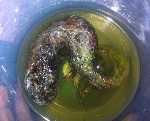
TRICHOTILLOMANIA, TRICHOPHAGIA AND TRICHOBEZOAR - AN INTERESTING CASE REPORT
Abstract
Trichotillomania is the condition of voluntarily pulling ones own hair. Trichophagia is
consumption of hair. Trichobezoar is a compact mass of hair, occupying the gastric cavity to a various
extent. Although trichotillomania as such may not be serious, untreated trichophagia secondary to
trichotillomania is a potentially life-threatening condition. Patient was a 7 year old girl who reported
with complaints of repeated hair pulling and eating hair for 2 years, abdomen pain for 15 days.
Investigations by imaging, revealed a solid mass in abdomen which was later confirmed to be hair by
endoscopy. On examination, hair loss was evident in scalp. Patient revealed some thoughts of
wanting to pull hair and consume them but there was no clarity in them. Patient was diagnosed a
case of Trichotillomania with Trichobezoar and was posted for surgery. Surgical removal of a
significant mass of hair was done. After post operative recovery, behaviour therapy was initiated.
Patient was regularly followed up in psychiatry OP and there was a good response to therapy but
after few months patient did not come for follow up. This case reveals that trichotillomania with
trichophagia can lead to emergency situations due to formation of trichobezoar. A better
understanding of the factors influencing this illness is essential to identify and treat trichotillomania
before the advent of serious complications.
Full Text:
PDFReferences
Diagnostic and Statistical Manual of Mental Disorders. 4th edn.. Washington, DC: American
Psychiatric Association; 2001. Text Revision
Christenson GA, Mackenzie TB, Mitchell JE. Characteristics of 60 adult chronic hair pullers. Am
J Psychiatry. 1991;148:365–370.
Stanley, MA.; Cohen, LJ. Trichotillomania and obsessive-compulsive disorder. In: Stein, DJ.;
Christianson, GA.; Hollander, E., editors. Trichotillomania. American Psychiatric Press; Washington
DC: 1999. p. 225-61.
Grant JE, Odlaug BL, Potenza MN. Addicted to hair pulling? How an alternate model of
trichotillomania may improve treatment outcome. Harv Rev Psychiatry Mar-Apr;2007 15(2):80–85.
Christenson GA, Mackenzie TB, Mitchell JE. Characteristics of 60 adult chronic hair pullers. Am
J Psychiatry 1991b;148(3):365–370
Sharma NL, Sharma RC, Mahajan VK, Sharma RC, Chauhan D, Sharma AK. Trichotillomania
and trichophagia leading to trichobezoar. J Dermatol 2000;27(1):24–26
DeBakey M, Ochsner A. Bezoars and Concretions, a Comprehensive Review of the Literature
with an Analysis of 303 Collected Cases and a Presentation of 8 Additional Cases. Surgery. 1938;
:934– 963. and Surgery 1939,5: 132–160.
Phillips MR, Zaheer S, Drugas GT. Gastric trichobezoar: case report and literature review. Mayo
Clin Proc. 1998;73:653–656.
Pérez E, Sántana JR, García G, et al. Perforación gástrica en adulto por tricobezoar (síndrome
de Rapunzel). Cir Esp 2005; 78(4): 268-70.
Sehgal VN, Srivastava G. Trichotillomania ± trichobezoar: revisited. Eur Acad Dermatol
Venereol 2006; 20: 911-5..
Stemberger RMT, Thomas AM, Mansueto CS, Carter JG. Personal toll of trichotillomania:
behavioral and interpersonal sequelae. J Anxiety Disord. 2000; 14:97–104.
Woods DW, Flessner CA, Franklin ME, et al. Understanding and treating trichotillomania: what
we know and what we don’t know. Psychiatr Clin North Am. 2006; 29:487–501.
Flessner CA, Woods DW, Franklin ME, et al. Cross-sectional study of women with
trichotillomania: a preliminary examination of pulling styles, severity, phenomenology, and functional
impact. Child Psychiatry Hum Dev. 2009; 40:153–167.
Stewart RS, Nejtek VA. An open-label, flexible-dose study of olanzapine in the treatment of
trichotillomania. J Clin Psychiatry. 2003;64:49–52.
Bouwer C, Stein DJ. Trichobezoars in trichotillomania: Case report and literature overview.
Psychosom Med 1998; 60: 658-60.
Refbacks
- There are currently no refbacks.

This work is licensed under a Creative Commons Attribution-NoDerivatives 4.0 International License.
An initiative of The Tamil Nadu Dr M.G.R. Medical University